Amir Normandi, No Hejab Is Required

Iranian-American photographer Amir Normandi took the Blogosphere
by storm in 2005, when his No Veil Is Required show at Harper College in Illinois was cancelled after a few Muslim students protested the inclusion of nudity in the exhibition.
Normandi, 57, who escaped Iran at the height of the Islamic Revolution in 1979 and emigrated to the United States, has been captivated by the visual image his entire life, taking more than One Million photographs in his long career as a professional photographer, which he continues to this day, at his d'Last Studios in Chicago.
MG: Amir Normandi, Welcome to the In T View. Could provide a description of yourself?
Amir Normandi: I am just another person with fascination of my surroundings, but lucky to have access to still cameras, enabling me to capture scenes and acts of my life theater.
MG: Amir, you were born in the beautiful Iranian city of Rasht on the edge of the Caspian Sea. A nice place? Would like to return to it? Did growing up in Rasht have any influence on your life's work?
Amir Normandi: Yes, Rasht is a very beautiful city and I would love to go back there. Unfortunately I did not grow up in Rasht. But, I was brought up under the influence of Rasht culture in Tehran, culture of respect for humanity and their habitats.
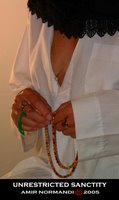 MG: You left your native Iran in 1979 right at the time of Revolution. What was your main reason for leaving? And was it a perilous escape?
MG: You left your native Iran in 1979 right at the time of Revolution. What was your main reason for leaving? And was it a perilous escape?Amir Normandi: I left my native land after casting a no vote for the Islamic Republic Regime. I left after witnessing my euphoric nation being cheated by a group of Religious Merchants, Mercenaries, Opportunists, and Traitors whom aided the re-invasion of Iran by the Islamic Sword.
MG: Amir, you've commented in the past, that your Great-Grandfather was, "revered as a saint with (a) blood line linked to Prophet Mohammad..." Can you go in to more detail about who your great-grandfather was?
Amir Normandi: Allegedly he was a -- holy/wise and learned man -- great-grand child of Prophet Mohammad. The Forefathers Shrine ( Jaad-Khaneh) where my great, great grandfather is buried, was declared a domain of Holy Centers and Religious Foundations in 1970. Even the brook that passes through my ancestor's land and his grave site was named -Tahir Goorab- (Chaste grave side-water). One of the legends about him is that his sandals use to come together after he took them off after entering a home. The lays still visit his shrine on Thursdays' eve of Islamic Sabbath day Friday.
MG: Amir, you became somewhat of a cause celebre in the Blogosphere and Media in 2005 when Harper College cancelled your No Veil Is Required photo exhibition, after Muslim students complained that the photographs were offensive. Even if the photographs were "Offensive" to Muslims, should they as a very small minority, have had the power to force Harper College to curtail your exhibition?

Amir Normandi: No, they should not have or be given the power, nor should a large majority have the power, to silence any member of society because of that member's thinking and stands.
MG: Harper College's International Studies Coordinator Richard Johnson, who was responsible for bringing No Veil Is Required to Harper College and closing the exhibition down, claimed in a 2005 Chicago Reader article, that your post-exhibition actions -- such as issuing a press release and having Chicago televison stations show up at your forum -- were a "'huge puiblciity stunt...'" How do you respond to these charges?
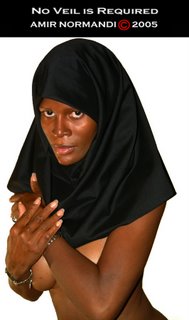 Amir Normandi: No matter how they spin it, Harper College gave democracy and freedom of expression a black eye by shutting down the "No Veil is Required Exhibit" . Even with my extensive effort in publicizing that dark day in Harper's history, reporters Alex Perez of NBC-5 and Ben Bradly of ABC-7 failed to see beyond the lawyers line which was put out by Harper's spokesperson. What was amazing that NBC-5 put out an on line survey that polled over 600 visitor of their internet site and 72% of them disagreed with Harper's action is shutting down my exhibition. In short: No it was not a stunt; it was a civil act to show the ugly face of censorship.
Amir Normandi: No matter how they spin it, Harper College gave democracy and freedom of expression a black eye by shutting down the "No Veil is Required Exhibit" . Even with my extensive effort in publicizing that dark day in Harper's history, reporters Alex Perez of NBC-5 and Ben Bradly of ABC-7 failed to see beyond the lawyers line which was put out by Harper's spokesperson. What was amazing that NBC-5 put out an on line survey that polled over 600 visitor of their internet site and 72% of them disagreed with Harper's action is shutting down my exhibition. In short: No it was not a stunt; it was a civil act to show the ugly face of censorship.MG: Why did you file a Censorship Lawsuit against Harper College for cancelling your exhibition and then decide to drop the case?
Amir Normandi: I did not file any lawsuit. The American Civil Liberty Union (ACLU) -- as an advocate of civil liberties -- wrote a letter of inquiry with regards to rules governing the display of art work inside the Harper's campus inline with the Illinois and the United States Freedom of Information Act. Since Harper hired a law firm that charged hundreds of dollars per hour to defend them instead of simply furnishing the data and being transparent, they went in to legal advisories mode by mailing irrelevant emails in duplicates and hiding themselves behind a different kind of veil. I did not want taxpayers money to be spent on defense of a grossly wrong decision.
MG: Was it necessarily a bad thing that your exhibit was cancelled, as it drew much more attention to your work and subject matter?
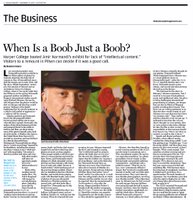 Amir Normandi: No, it was a good outcome in spite of Harper's misguided reaction in removing my exhibit.
Amir Normandi: No, it was a good outcome in spite of Harper's misguided reaction in removing my exhibit.MG: And what was the central theme of No Veil Is Required?
Amire Normandi: Self determination and defiance of gender-specific dress code.
MG: Amir, you are anti-Hejab or Hijab. Can you explain for those who don't know, what a hijab is, and why you're against it?
Amir Normandi: Hejab is the general term for the compulsory dress code for women in Islamic societies. This Hejab is the same covering known as ABAYA in Saudi Arabia, Burqua in Afghanistan, and Chador in Iran. I am against forced Hejab which is a gender specific dress code and a tool for domination of women. It is almost always enforced by men and it is a segregation method which ends up making a woman a half human.
MG: If you portrayed Christian women in robes exhibiting some nudity would there have been any sort of outcry, and would Harper College have allegedly caved in like they did?
Amir Normandi: I do not have an answer to this Q, but that gives me an idea for future projects.
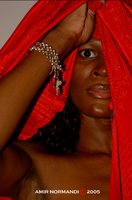 MG: Why is Academia so intimidated by Islam?
MG: Why is Academia so intimidated by Islam?Amir Normandi: Academia is suffering from many phobias. It is not Islam-o-phobia only. I think as a matter of policy the academia needs to learn bravery and honesty from their student body, which have been inspiring through out recent history.
MG: Can you tell us why No Veil Is Required was dedicated to Zahra Kazemi and Theo Van Gogh?
Amir Normandi: Because they too have hoped with their images, giving the world another jolt in opening their eyes to the traditional oppression of women!
MG: What would you say was the most powerful image in your exhibition and why?

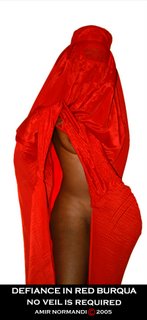
Amir Normandi: First, "No Veil is Required - Tahira." That image was inspred from the life story of "Tahira Qurat-al_an" whose (self) unveiling about 100 years ago caused a few hardliners to slit their own throat in Badakh-sh.
Second is "Defiance in Red Burqua" which sympathizes with the struggle of Afghani women and their home grown brand of Islam and the recent version imported by Saudi brand of Islam: WAHABI's courtesy of Osama Bin Laden.
Third is "Safe in Saudi Arabia" which tells the world that the Saudi's are holding the people inside and out side of their borders at gun-point!
MG: Did you think of vieling some Muslim
men or placing them in burkhas, and entitling the image, "How Do You Like This?"
Amir Normandi: As a matter of fact I have and I will.
MG: There certainly is an element of Sexuality and Eroticism in the No Veil Is Required images. Was that purposely done on your part?
Amir Normandi: Yes, purposely and by design. For a show of defiance in response to those who consider women child bearers -incubator for men- and by denying women any sense of self-worth or human desire.
MG: In your introduction to No Veil Is Required, you state, "women's rights IS human rights, women's freedom is equality for everyone." You obviously see a linkage between veiling women and a loss of women's rights. Can you expound on this?
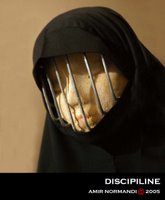 Amir Normandi: When you subjugate children with specific gender to a dress code when they reach the age of 7 and start segregating them, and then considering them (worth) half of the other gender by giving them half of inheritance rights, and half the restitution if they were dismembered by accident or because of a criminal act. Deny them divorce rights, child custody rights, travel rights, and many other inequalities that began with forced veiling. To me this is the most tangible form of gender apartheid and discrimination, which is a human rights issue.
Amir Normandi: When you subjugate children with specific gender to a dress code when they reach the age of 7 and start segregating them, and then considering them (worth) half of the other gender by giving them half of inheritance rights, and half the restitution if they were dismembered by accident or because of a criminal act. Deny them divorce rights, child custody rights, travel rights, and many other inequalities that began with forced veiling. To me this is the most tangible form of gender apartheid and discrimination, which is a human rights issue.MG: One of the criticisms levelled at No Veil is Required is that you didn't use Muslim women as models for the photographs. Why didn't you use Muslim women?
Amir Normandi: I have featured Muslim women in my photographs protesting the gender specific compulsory dress code, but the issue of gender apartheid goes beyond Islamic practice. In some place it is adopted by Islam from a region and proliferated by Muslims to other faiths, such as: Christian women in Jordan, Palestine, and other countries which suffer under the same
mistreatments.
MG: Do you worry that Radical Moslims will target your livelihood in the US because of the nature of your work?
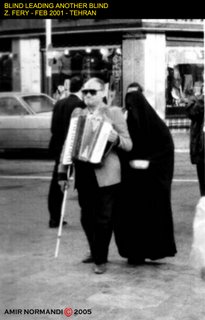 Amir Normandi: I am not worried about radicals in USA - They are not here because they advocate a strong faith. They are here to get wealthy - this bunch usually talks, they only talk when they know their wealth is secured otherwise, they keep quiet.
Amir Normandi: I am not worried about radicals in USA - They are not here because they advocate a strong faith. They are here to get wealthy - this bunch usually talks, they only talk when they know their wealth is secured otherwise, they keep quiet.MG: Have you been allegedly threatened by CAIR yet?
Amir Normandi: I have been threatened; but, I do not know their affiliations.
MG: Andres Serrano's controversial work Piss Christ was supported by a grant from the National Endowment for the Arts - Do you think your No Veil Is Required should have been similarly entitled?
Amir Normandi: I need financial support for my campaign/projects; but I don't feel I am entitled to that.
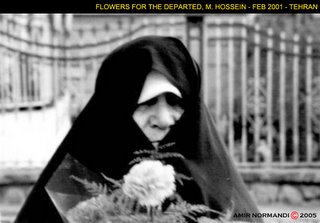 MG: Amir, in a response to comments made about your exhibition, you are quoted as saying, "I believe most of the anger and rage in my region of the world is a direct result of oppression of women." Amir, the question to ask then is, "Why are Women being Oppressed in the Middle East?" Is it the misogynistic nature of Islam, for Islam is the prevailing religious and cultural force in your region of the world?
MG: Amir, in a response to comments made about your exhibition, you are quoted as saying, "I believe most of the anger and rage in my region of the world is a direct result of oppression of women." Amir, the question to ask then is, "Why are Women being Oppressed in the Middle East?" Is it the misogynistic nature of Islam, for Islam is the prevailing religious and cultural force in your region of the world?Amir Normandi: No, it is not Islam only; in my region there are Christians and followers of other faiths that oppress their women. I know Assyrian and Armenian Christians of my region do oppress their women. I even know of cases of oppression in the United States.
MG: Do you personally know of any women who were mistreated by the Iranian authorities and can you tell us about them?
Amir Normandi: More than one. Fortunately, they are here in the USA or Europe. But, many, many are still in Iran like Shahrnoosh Parsi Pour, Shohreh Aghdashloo, Ezzat Goshehgir, among the well knows to name a few. But, I came to know quite a few more through my other job as an interpreter/translator for asylum seekers, which I served between 1981 to '90. I came in close contact with many victims who may volunteer to be the subject of my future projects.
MG: Amir, The Middle East: Dictators, death, and despair, explosions, endless wars, poverty, subjugation and hostility towards women, honor killings, genital mutilation, suicide bombings, the fury of the Arab Street, pollution, human trafficking, ignorance, ignorance, ignorance...Should a two hundred-foot fence be built around the entire Middle East and anyone attempting to escape be shot? Should not we try to contain the Madness within before it affects us all?
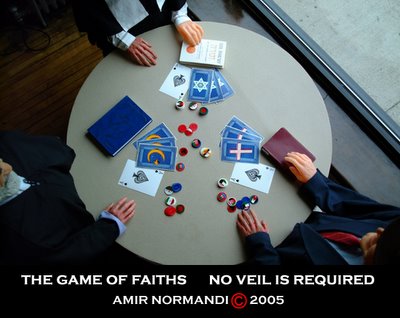 Amir Normandi: The madness is affecting billions already. No walls my friend, walls and veils are to be brought down. We should demand openess and compel industrial democratic governments to stop aiding and abetting corrupt dictators in the region. We can not sell democracy; we need to expand democracy, not only to create a new market for industrial nations; we can do that for the sake of humanity. By promoting democracy all parties are bound to gain.
Amir Normandi: The madness is affecting billions already. No walls my friend, walls and veils are to be brought down. We should demand openess and compel industrial democratic governments to stop aiding and abetting corrupt dictators in the region. We can not sell democracy; we need to expand democracy, not only to create a new market for industrial nations; we can do that for the sake of humanity. By promoting democracy all parties are bound to gain.MG: Amir, are you worried about family members and friends back in Iran?
Amir Normandi Yes I am worried for my family and friends. Their wellbeing is one of my biggest concerns.
MG: If there's a regime change in Iran to a more democratic state, will you be returning to your homeland?
Amir Normandi: Yes, my friend, I want the right of return to my birth land. I have been in the States too long to let go. I have deep roots here; my adult children do not know any other city as home. Chicago is home now.
MG: Would you be in favor of an American attack against the Iranian nuclear facilties to prevent the current regime in Iran from developing a Nuclear Weapon?
Amir Normandi: I do not want the current regime of Iran to gain any additional power. As far as nuclear weapons, I would like to see every country's nuclear weapon de-activated. Bombing Iranian territory to punish the Islamic regime is NOT PRUDENT.
MG: Iran's President Mahmoud Ahmadinejad has called for Israel to be "wiped off the map" or alternatively moved to Europe or Alaska. What is the Iranian's regime fascination for Israel?
Amir Normandi: The Islamic Republic's platform has been anti US/Israel since its inception, for many contradictory reasons coming from US resentment. But, the Iranian people historically have shown respect and kindness toward followers of Moses and so are the followers of Islam, I do not know about this goon?
 MG: And why does the existense of Israel burden the Islamic world so?
MG: And why does the existense of Israel burden the Islamic world so?Amir Normandi: I do not have an answer for that, personally I am for live and let live and do not support any destruction.
MG: Most artists have voiced their opposition to the U.S. intervention in Iraq. Are you one of them?
Amir Normandi: Since mostly innocent people of Iraq along with the young soldiers of the Coalition Forces are paying the tolls with their lives, I could not have been supportive of the initial action. But now after this huge scarifies I want unwavering stand in installation of a secular government.
MG: Photography is your art, your love, and your life, an all encompassing mistress: Is this ever a burden to you?
Amir Normandi: No, never, I have never regretted becoming a photographer.
MG: Portraiture, Figure, Landscape, Abstraction, Sports, Surrealism, Post Modernism, New Wave: Is there a specific photographic genre that suits your being more than others?
Amir Normandi: Life pictography with a mission is my genre.
MG: Do you feel you can express everything you want to say through photography?
Amir Normandi: Yes, but there are only two minor obstacles, Money/Time;
otherwise, any thing can be expressed by photography.
MG: Is there an act of creation involved in taking a photograph?
Amir Normandi: In my projects the answer is a resounding YES. My frames are freeze shot of life as it happens or by re-enactment.
MG: Photographic Mission Impossible: In 2001, you smuggled out of Iran some 500 images taken by Iranian students, putting yourself at risk of imprisonment and torture by the Iranian authorities, since it is illegal to take photographs there without official permission. What possessed you to smuggle the images out of Iran?
Amir Normandi: For some reason I was very confident that I'll be fine. The only worry I had was losing the prints, negatives and CDs in transit to US. So, I did not think of the risks till I was taken in to the special interview room.
MG: And how did you react to criticism by local Iranians in your area that you put the Iranian students in Iran at risk?
 Amir Normandi: The students were not at risk because we used measures to protect them. About the local Iranians, they ought to learn some gallantry from those students and perhaps instead of smuggling antiques and valuables out of Iran to add to their personal wealth, they could help in other similarendeavors for democracy in Iran.
Amir Normandi: The students were not at risk because we used measures to protect them. About the local Iranians, they ought to learn some gallantry from those students and perhaps instead of smuggling antiques and valuables out of Iran to add to their personal wealth, they could help in other similarendeavors for democracy in Iran.MG: Where can we find out more information about your photography and you?
Amir Normandi: With the help of human right activist Diane Carriere a site is coming soon.
(MG says: The sites have arrived. Amir and Diane have collaborated on the following Blogs:
Amir's Bio
Amir's Human Rights
Portfolio & Statements
Amir's Links - Blog & Media Response
to Amir's Works - Photographs )
MG: Amir, if there's one thing you could do in your life that you haven't done already, what would it be?
Amir Normandi: To abolish borders and create a true world citizenship. And then work on the details later.
MG: Thanks Very Much Amir for a nice In T View and final question: Have you ever photographed a Ghost?
Amir Normandi: Not yet, but I'll be very interested.
In T View By MG
Layout & additional research: Diane - AFD


8 Comments:
Great interview Amir & MG.
Perfect timing with the fury over the cartoons of Mohammed!
I would like to know more about the Iranian woman who unveiled a hundred years ago and got executed for that.
Thanks again, Amir, can't wait to see your new work that is coming.
This was one of the best interviews yet. I left some comments at IBC, but I wanted to say that I really appreciate the effort MG and DC went to making this interview and I hope that Mr. Normandi has many long years of photographic activism.
Just read this a third time, thanks to both of you gentlemen.
A brave man.
He seems like a very sweet man. Thank you.
This comment has been removed by the author.
Rosemary, :-).
Those that insist on enforcing women’s dress codes which, in the most conservative examples, force women to go about in what could be viewed as ‘sacks’ with eye holes cut in them are not, in my view, protecting the honour of women. Rather they are dishonouring themselves by demonstrating that they don’t have the strength of character, sincerity of spirit or personal will to control their own basest instincts. The emotional (EQ) and spiritual (SQ) quotients of intelligence seem to be lacking in many. IQ is a ‘fluke’ and is not enough, the other two quotients are essential in large amounts to overcome personal stupidity or is it that they suffer from plain old ‘dumbness’ borne of a cultural indoctrination that looks to the past and pleads for the return of the ‘dark ages’!
Post a Comment
<< Home